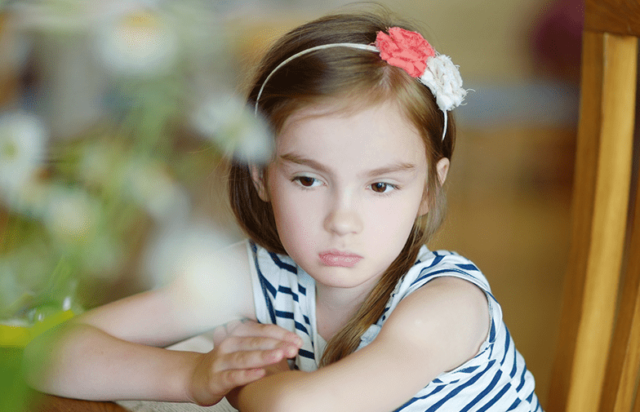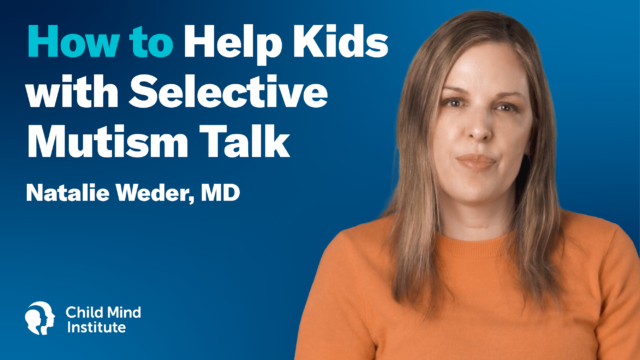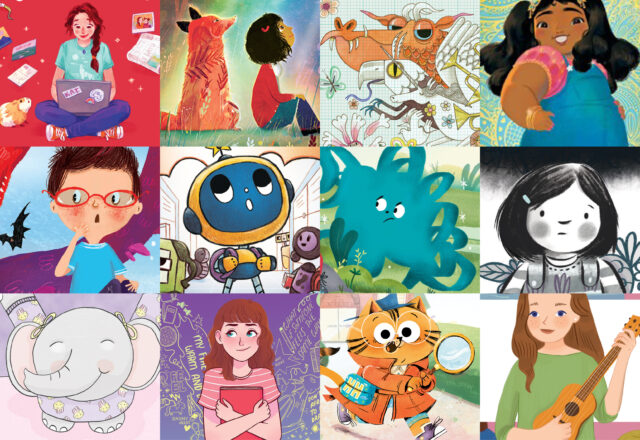Ask an Expert
My son, who has been taking Prozac for selective mutism, is now completely verbal in school. When can we start taking him off it?
Clinical Expert: Natalie Weder, MD
en EspañolMy son was diagnosed with selective mutism when he was 6 years old. We started him on Prozac a year ago in October. He's now 9 and completely verbal in school since the start of the school year. When can we start weaning him off Prozac? Once he's off the medication, is there a chance of him being non-verbal again in school? Would you ever put a child back on the same medication and would it have the same effect?
Selective mutism is an anxiety disorder that is characterized by a child’s inability to communicate in specific settings. The evidence-based treatment of choice for anxiety is behavior therapy, which helps kids face their fears successfully, without needing to avoid the thing that makes them anxious. Therapy for kids with selective mutism helps them gradually speak in the fearful settings until they are confident enough to do it without fear. When selective mutism is moderate or severe children sometimes also take SSRI medication in combination with the therapy.
You don’t mention if your child has been doing any therapy, but you do say that he has been completely verbal in school since the start of the year, so that indicates he’s feeling confident when talking.
Typically we continue kids on medication for about a year after they’re symptom-free or very close to symptom-free, because we’ve seen that they tend to have fewer relapses than those who go off sooner. By the time we start to take them off, they’ve had so many positive experiences from speaking aloud without any bad consequences that they tend to have positive outcomes.
The medication is usually tapered off gradually, always monitoring for any reappearance of symptoms. If at any point we see the reappearance of symptoms, we recommend booster sessions of therapy.
For the majority of children, if they reached remission and are taken off the medication gradually, they will continue being verbal. If the symptoms come back and you try therapy and it isn’t enough, then you can certainly retry the medication. Typically it has the same or similar therapeutic effect when it is reinstituted.
Was this article helpful?
Related Reading
-
 Best Anxiety Medication for Children and Teens
Antidepressants trump all others as the most effective evidence-based choice
Best Anxiety Medication for Children and Teens
Antidepressants trump all others as the most effective evidence-based choice
-
 Anxiety and Mindfulness
Teaching kids how to live in the present
Anxiety and Mindfulness
Teaching kids how to live in the present
-
 Selective Mutism: Helping Kids Find Their Voices
Anxiety makes kids unable to speak in some settings, usually outside the home
Selective Mutism: Helping Kids Find Their Voices
Anxiety makes kids unable to speak in some settings, usually outside the home
-
 Teacher’s Guide to Selective Mutism
In this guide we explain what SM looks like in the classroom and offer tips…
Teacher’s Guide to Selective Mutism
In this guide we explain what SM looks like in the classroom and offer tips…
-
 Complete Guide to Selective Mutism
Children with selective mutism (SM) are talkative at home but unable to speak in more…
Complete Guide to Selective Mutism
Children with selective mutism (SM) are talkative at home but unable to speak in more…
-
 Quick Guide to Selective Mutism
A brief overview of the signs and symptoms of selective mutism, as well as treatments.
Quick Guide to Selective Mutism
A brief overview of the signs and symptoms of selective mutism, as well as treatments.
-
 ‘Brave Talking’ Helps Kids Beat Selective Mutism
Kids with selective mutism find their voices
‘Brave Talking’ Helps Kids Beat Selective Mutism
Kids with selective mutism find their voices
-
 When Kids Refuse to Go to School
How to recognize what's called 'school refusal' and how to get kids back in class
When Kids Refuse to Go to School
How to recognize what's called 'school refusal' and how to get kids back in class
-
 77 Children’s Books About Mental Health
Best books for helping kids understand emotional and learning challenges
77 Children’s Books About Mental Health
Best books for helping kids understand emotional and learning challenges
-
 Selective Mutism and Starting Kindergarten
What to do to help kids with SM transition to elementary school
Selective Mutism and Starting Kindergarten
What to do to help kids with SM transition to elementary school
-
 How do you tell the difference between Asperger’s and selective mutism?
A child with SM is unable to talk only outside the home. A child with…
How do you tell the difference between Asperger’s and selective mutism?
A child with SM is unable to talk only outside the home. A child with…
